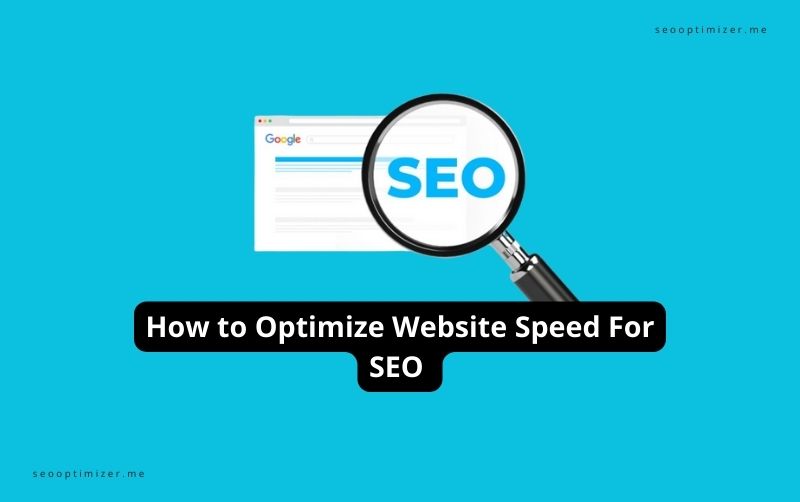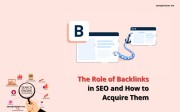How to Optimize Website Speed For SEO

If you are able to Optimize Website Speed for SEO, then you have unlocked the gateway to attracting traffic for search engines. A website that loads swiftly is positioned in search engine results pages (SERPs) as superior compared to a sluggishly loading one. This is primarily because search engines like Google prioritize user experience and regard website speed as a significant metric in their website ranking algorithm. Enhancing the speed of your website through optimization can enhance its rankings, augment incoming traffic, and bolster conversion rates.
What is Website Speed?
Website speed pertains to the speed at which a website displays its content, including the duration it takes for a web page to commence rendering (i.e., displaying content) and the duration required for all content to complete loading. Several elements influence a website's speed, including its hosting provider, design, coding, and the user's internet connection.
Also read: The Significance of Mobile Optimization in SEO
Does Website Speed Matter for Search Engine Optimization?
Yes, website speed matters for SEO, and the significance of website speed in SEO lies in its impact on user experience. A website that loads slowly can create an unfavorable user experience, potentially causing users to return to the search engine results page and choose an alternative website. If this pattern repeats regularly, it sends a signal to search engines that the website doesn't deliver a satisfactory user experience, potentially resulting in a decline in its ranking.
Also read: Beginners Guide to ON-Page SEO
Also read: Beginners Guide to OFF Page SEO?
Also read: What is Technical SEO
How to Optimize Website Speed for SEO
Below are 6 steps that will help you optimize your website speed;
1. Fast and Secure Hosting Provider:
Your website's hosting provider is the foundation of your website's speed. If your hosting provider is slow or unreliable, your website will be slow as well. Therefore, it's important to choose a hosting provider that is fast and reliable.
There are many hosting providers available, and the quality and speed of their service can vary greatly. Look for a hosting provider that uses fast and modern hardware, has a good uptime record, and offers scalable solutions that can accommodate your website's growth.
Suggested: Best Hosting Provider
2. Optimize Server Response Time:
Server response time indicates the duration required for the server to answer a user's request. A sluggish server response time can have a notable influence on website speed, regardless of any other optimization that has been done on the website. Choose a secure and fast hosting provider that provides fast server response time.
3. Enable Browser Caching:
Browser caching permits browsers to retain static files like images and CSS files on a user's device, eliminating the need for repeated downloads when the user revisits the website. This can substantially enhance website speed, particularly for users who return to the site. To activate browser caching, you can include caching headers in your website's response headers. These headers instruct the browser on the duration for which it should cache the files and when to check for updates.
Also read: SEO Auditing & How to Conduct an SEO Audit for a Website
Also read: 11 Ways to Measure the Success of your SEO Strategy
4. Minimize HTTP Requests:
Whenever a user accesses your website, their browser sends HTTP requests to your server to fetch the website's content. The greater the number of HTTP requests your website necessitates, the more prolonged the loading time will be.
Follow the steps below to minimize HTTP requests:
- Merge various CSS and JavaScript files into a single file to minimize the volume of essential HTTP requests.
- Use CSS sprites to consolidate multiple images into one, thereby diminishing the necessary HTTP requests.
- Implement lazy loading for images and videos to postpone the loading of non-essential content until it becomes necessary."
5. Minimize JavaScript and CSS:
JavaScript and CSS files are technical SEO and serve as fundamental elements in contemporary websites, but their performance may hinder website speed if not properly optimized.
Do the following in order to minimize JavaScript and CSS:
- Enhance your CSS coding efficiency by using a CSS preprocessor like Sass or Less.
- Minify JavaScript and CSS files by eliminating redundant characters, such as white spaces and comments.
- Use asynchronous loading of JavaScript files to minimize their influence on website speed.
6. Optimize Images:
Image optimization is part of ON page SEO. Images often play a major role in causing websites to load slowly. large images indicate more request and load time, thereby affecting the website speed.
Follow the steps below to optimize your website's images;
- Optimize images by compressing them to reduce file size while preserving quality.
- Use responsive images that adapt to the user's device and screen dimensions automatically.
- Use the appropriate image format: JPEG for photographs, and PNG for images with transparency requirements. For smooth user experience, use webp image format which is modern image format that provides superior lossless and lossy compression for images on the web.
What's Next –
Start SEO Optimization. Analyze your website with Free SEO Optimizer
Audit your website for Free - SEO audit free
Suggested Read:
Also read: SEO for Beginners – Ultimate Guide
Also read: RoadMap to Becoming An SEO Expert
Also read: 15 Top SEO Experts and Specialists
Also read: AI SEO – The Impact of Artificial Intelligence on SEO Strategies
Also read: Google Indexing and How Web Crawler Works




